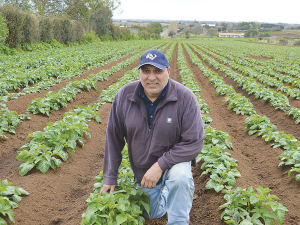Damage to country's vegetable crops still being calculated
Local vegetable growers are in full “clean up, tidy up” mode, says Pukekohe Vegetable Growers’ Association (PVGA) president, Kirit Makan.
 Pukekohe Vegetable Growers Association (PVGA) president Kirit Makan says compliance and regulation is making it harder for growers to continue producing fresh and healthy vegetables for New Zealanders.
Pukekohe Vegetable Growers Association (PVGA) president Kirit Makan says compliance and regulation is making it harder for growers to continue producing fresh and healthy vegetables for New Zealanders.
New regulations and compliance issues are making it harder for growers to continue producing fresh and healthy vegetables for New Zealanders.
That's the view of new Pukekohe Vegetable Growers Association (PVGA) president Kirit Makan.
Makan told Hort News that growers are anxious. He says they are uncertain what regulations will be imposed on their farming operations around water and land use and the environment.
"We are here to produce fresh and healthy vegetables for New Zealanders and it's getting harder and harder for us," Makan explains.
The PVGA represents 180 growers - covering an area from Warkworth north of Auckland to South Waikato. Most growers are based in the Pukekohe hub - an area comprising 4,359 hectares of some of New Zealand's most fertile and productive soils.
The area's temperate, forgiving climate and proximity to essential transport routes makes it ideally located to supply year-round vegetables to Auckland and the rest of New Zealand.
However, like farmers around the country, PVGA members are also under pressure to make further improvements to farming around fertiliser usage and water quality.
Makan says like other farmers his members use fertiliser to produce marketable yield of crops. He says lowering fertiliser input would push some growers out of business.
"We just don't throw fertiliser down just for the sake of it, we need to put it down to get a marketable crop that we can sell," he adds.
"The economics of that would be I won't have a marketable crop and growing potatoes just wouldn't be viable for me."
Makan says vegetable growers, like other farmers, are keen to reduce their inputs like fertiliser.
He believes, over time, technology will come along and help growers over time reduce their fertiliser footprint.
On water supply, farmers aren't sure what the new regulations will look like.
All growers around Pukekohe have resource consents for bore and ground water takes which will need to be renewed in coming years.
Makan says while Pukekohe has been carved out of the National Policy Statement for water, there are "too many unknowns".
NZPork says the Government needs to strengthen its proposed planning laws to ensure New Zealand's pig farmers can continue to produce pork.
Good news for kiwifruit growers - a record crop with forecast per hectare returns at record levels for all fruit categories for the 2025-26 season.
As guests gathered on what is known as the Speaker's Lawn - a beautifully manicured patch of grass behind the main buildings of Parliament - to mingle and enjoy a lamb chop to celebrate National Lamb Day, the mood was very much upbeat.
Global dairy prices are on a roll, recording a fourth consecutive jump on the Global Dairy Trade (GDT) auction this year.
Booming primary sector exports are helping lift earnings for farm service providers.
The world is waking up to the disadvantages of carpets derived from petrochemicals, creating opportunities for New Zealand strong wool.